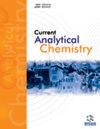A Study on the Anti-inflammatory Activity of Clematis tangutica Using Molecular Networking
IF 1.7
4区 化学
Q3 CHEMISTRY, ANALYTICAL
引用次数: 0
Abstract
Background:: Clematis tangutica, an indigenous medicinal herb native to the Qinghai- Tibet Plateau of China, has traditionally been associated with treating various inflammation-related diseases. While its therapeutic potential is recognized, a comprehensive characterization of its metabolite molecules and their anti-inflammatory properties has not been undertaken. Objective:: This study aimed to comprehensively profile the metabolite molecules of Clematis tangutica and identify potential anti-inflammatory active molecules using the Activity Labelled Molecular Networking (ALMN) approach. Methods:: The ALMN approach was employed to visually label activity to the feature-based molecular network, allowing for the profiling of potential anti-inflammatory active molecules in Clematis tangutica. Through correlating activity levels with the respective molecules, a detailed profiling was achieved. Results:: Out of the 8,644 metabolite molecules in Clematis tangutica, ten were identified as the most potent anti-inflammatory molecules. Among these, Spiraeoside was notably annotated along with its structure. Conclusion:: This research successfully identified ten potent anti-inflammatory molecules from the vast metabolite profile of Clematis tangutica, including a detailed annotation of Spiraeoside. This marked a significant step in bridging traditional therapeutic knowledge with modern molecular profiling techniques.利用分子网络研究唐铁线莲的抗炎活性
背景唐铁线莲(Clematis tangutica)是一种原产于中国青藏高原的本土药材,传统上用于治疗各种炎症相关疾病。虽然其治疗潜力已得到认可,但对其代谢物分子及其抗炎特性的全面描述尚未开展。研究目的本研究旨在利用活性标记分子网络(ALMN)方法,全面分析唐铁线莲的代谢物分子,并确定潜在的抗炎活性分子。研究方法采用ALMN方法将活性直观地标记到基于特征的分子网络中,从而分析出虎杖中潜在的抗炎活性分子。通过将活性水平与相应的分子关联起来,实现了详细的剖析。研究结果在唐铁线莲的 8,644 个代谢物分子中,有 10 个被鉴定为最有效的抗炎分子。其中,Spiraeoside 的结构得到了显著的注释。结论这项研究成功地从唐铁线莲的大量代谢物中鉴定出十种强效抗炎分子,包括对 Spiraeoside 的详细注释。这标志着在将传统治疗知识与现代分子剖析技术相结合方面迈出了重要一步。
本文章由计算机程序翻译,如有差异,请以英文原文为准。
求助全文
约1分钟内获得全文
求助全文
来源期刊

Current Analytical Chemistry
化学-分析化学
CiteScore
4.10
自引率
0.00%
发文量
90
审稿时长
9 months
期刊介绍:
Current Analytical Chemistry publishes full-length/mini reviews and original research articles on the most recent advances in analytical chemistry. All aspects of the field are represented, including analytical methodology, techniques, and instrumentation in both fundamental and applied research topics of interest to the broad readership of the journal. Current Analytical Chemistry strives to serve as an authoritative source of information in analytical chemistry and in related applications such as biochemical analysis, pharmaceutical research, quantitative biological imaging, novel sensors, and nanotechnology.
 求助内容:
求助内容: 应助结果提醒方式:
应助结果提醒方式:


